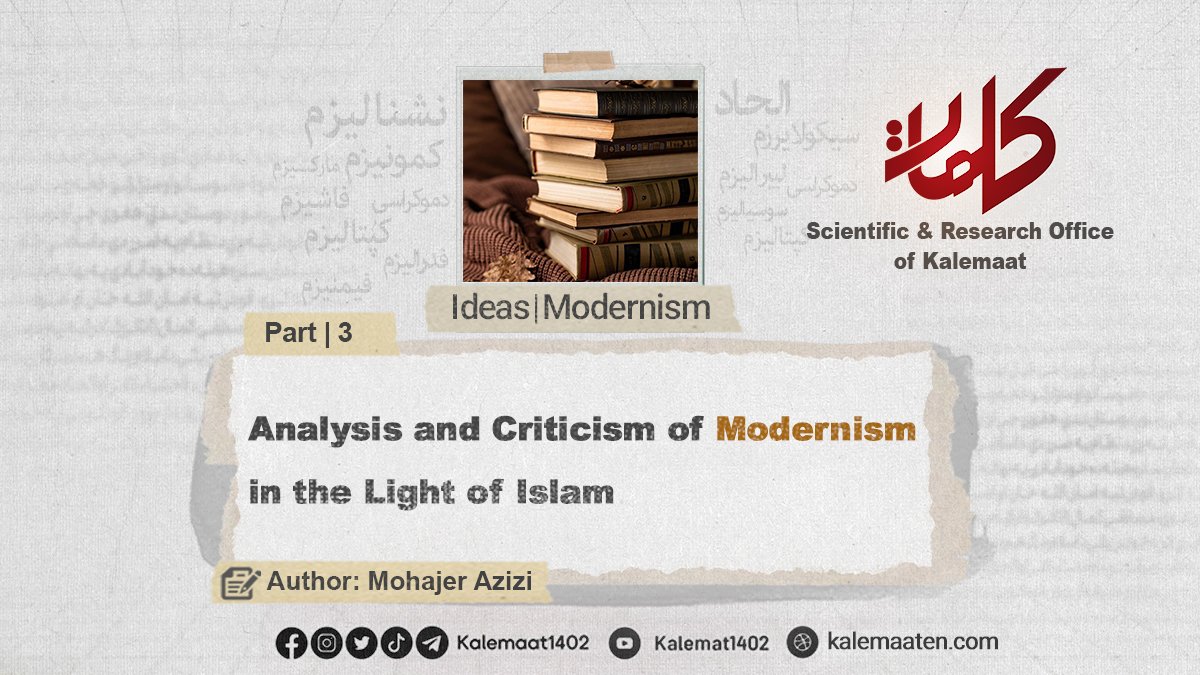Author: Mohajer Azizi
Analysis and Criticism of Modernism in the Light of Islam (Part 3)
C. A Comprehensive and Selected Definition of “Modernism”
Although the previously mentioned definitions each express a part of the reality of modernism, none of them alone can comprehensively cover all aspects of this phenomenon. Therefore, a relatively comprehensive and selected definition of “modernism” is presented below—one that has drawn the attention of many scholars in the fields of thought and ideology.
Dr. Harith Fakhri, a prominent expert in this field, provides a concise and coherent definition of modernism. In his book, he writes: According to my viewpoint and based on the studies conducted, there is a general consensus among most advocates of modernism around the following key principles:
1. Reliance on reason as the primary source of knowledge, although the degree of this reliance varies among them.
2. Striving to liberate the world from its current crisis, including backwardness and underdevelopment. This effort may involve a complete or gradual rejection of the past heritage, imitation of the Western model, or selective adoption of parts of it.
3. A type of fascination with Western civilization, including its ideas, methods, and technologies, albeit with differing intensities.
4. A negative view of the past heritage, seeing it as the main cause of society’s backwardness.
5. An oppositional attitude toward the relationship between man and the world, contrary to the Islamic view of coexistence and stewardship (khalifah); according to this view, man must strive to dominate the world.
6. A focus on human beings and worldly life as the ultimate goal, based on the belief that human happiness can only be achieved in this world and within the framework of material values.
Based on these principles, Dr. Fakhri defines modernism as follows: “Modernism is an attempt to create a new model in thought and life that transcends traditional heritage and frees itself from its restrictions, in order to—by relying on reason and Western modern methods—enable human advancement and development, and shape the world according to human desire.” [1]
D. The Concept of the Modernist (Arabic: الحداثي)
A modernist or reform-minded thinker is someone who deeply believes in the principles, methods, and intellectual values of modernism and bases their analysis and actions on them. A modernist views the world through the lens of rationality, scientism, individualism, and progress, and usually adopts a critical stance toward tradition, religion, and past authorities.
Dr. Ali Harb says the following regarding modernism and the modernist: “Modernism is not merely a lifestyle—it is an ideology that structures positions and thoughts. This ideology sometimes acts like a curtain that hides reality or unintentionally distorts facts. Nevertheless, for its proponents, modernism has turned into an ideology with a specific project. From this perspective, the modern thinker is one who maintains a critical relationship with himself and constantly revisits his authorities, institutions, and intellectual mechanisms in order to identify weaknesses and create new capacities for thought and expression.” [2]
A modernist is someone whose ideology is based on an interpretation of reality and texts grounded in assumptions that prioritize reason, doubt, and deconstruction. He accepts modernism as the ultimate endpoint of knowledge and as a standard for evaluating truths. He treats texts as intellectual data that are open to critique and transformation. The modernist discourse simultaneously conceals and distances itself from the text, while also claiming to uncover what the text has hidden.
For this reason, Taha Abdul Rahman suggests that instead of using the term “modernist” (al-ḥadāthī), we should use the term “modernizer” (al-ḥadāthawī). This is because a modernizer is someone who merely imitates the Western model of modernity, whereas a modernist does not necessarily follow this path of imitation. [3]
Some Key Goals of Modernists:
1. Modernists strive to abandon old rules and traditions and create new forms.
2. They choose reason as their standard and criterion, set aside the authority of tradition and revelation, and always have plans in this regard, seeking to implement them in the real world.
3. They regard empirical science as the driver of human progress and seek to expand the teaching of natural sciences, medicine, and industry—since this enables them to achieve their main objective: sidelining old culture and heritage.
4. Modernists or reformists believe in individualism. According to them, the individual must be freed from the dominance of tradition, family, religion, and authoritarian governments.
5. They advocate for the separation of religion from the realms of politics, law, and education so that a rational, secular, and neutral system toward personal beliefs can be established.
6. And so on…
Continues…
Previous Part/ Next Part
References:
[1] Harith Fakhri, Al-Ḥadathah wa Mawqifuha min al-Sunnah, p. 33.
[2] Ali Harb, Hadīth al-Nihayat, p. 34.
[3] Taha Abdul Rahman, Ruḥ al-Ḥadathah: al-Madkhal ila Ta’sis al-Ḥadathah al-Islamiyyah, p. 47; Al-Ḥadathah wa Mawqifuha min al-Sunnah, p. 35.



